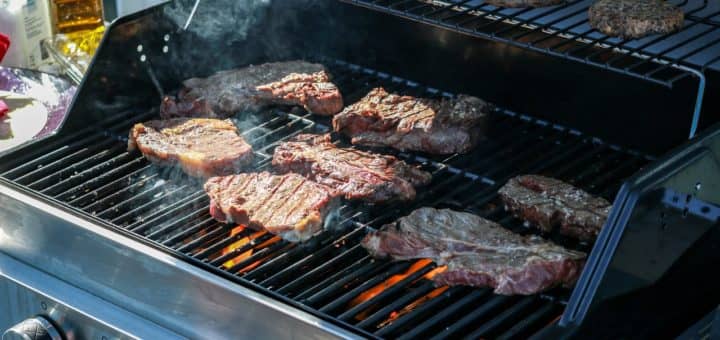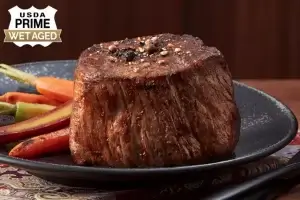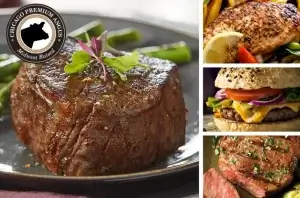
Table of Contents
Is a Charcoal or Gas Grill Better for Steak?
In meat-loving circles, few topics get argued more intensely or more often than charcoal vs. gas grills. Stumble onto any barbecue or carnivore-centric message board, and you’re sure to bump heads with any number of gas-fiends and charcoal-fanatics. The problem – as with most of these debates – is that one isn’t actually better than the other. Instead, each is better at a few particular things.
At the risk of over-simplifying, the endgame looks something like this:
- Gas grills are much cleaner, more convenient, and easier to cook with.
- Charcoal grills are cheaper and, in the hands of an expert, can achieve certain results that gas grills can’t.
Of course, gas-proponents will tell you that charcoal’s added benefits are narrow, and those expert, charcoal results only matter for a sliver of dishes.
But is steak one of them? And, if so, exactly what difference can a charcoal grill make to your T-bone or ribeye?
To find out, we’ll break down what sets gas and charcoal apart, and what those differences mean to your steak.
Gas Grills – Pros vs. Cons
When it comes to gas grills, the benefits are easy to spot.
Pros– Gas grills are cleaner to handle, take less time to warm up, require less babysitting, and are less prone to flare-ups. In the broadest terms, gas grills are faster and easier to cook with.
Even more importantly, two-burner gas grills allow for easy two-zone grilling. Two-zone grilling involves bringing one side of the grill to its hottest possible temperature and keeping the other side at a lower temperature. For steaks, this means you have one area for searing and another for bringing your steaks to the desired temperature. This is widely considered one of the best ways to grill a perfect steak.
Cons– On the other hand, most gas grills struggle to reach the temperatures charcoal grills are capable of, and are poor at searing meats as a result. Only a small range of expensive gas grills deliver the same searing power as charcoal. And while most claims about charcoal’s aromatic, flavor-enhancing properties are untrue, charcoal grills are better for smoking meats, and there is at least one aromatic compound released by burning charcoal that sets it apart from gas.
Charcoal Grills – Pros vs. Cons
Pros– In terms of smoke and flavor, charcoal grills not only smoke meats better than gas, they also release a chemical called guaiacol. Guaiacol is an aroma compound that gives meat a smoky, bacon-like flavor, and it only comes from wood and charcoal.
In terms of temperature, the average charcoal grill heats up to around 200 degrees hotter than your average gas grill. This is the biggest selling point for charcoal over gas, as certain recipes and dishes demand that extra heat…
Cons– Charcoal is messy and can be a pain for clean-up. It takes longer to get up to temperature, which means waiting two to three times as long to start grilling.
Also, it’s much harder to get to the right temperature (unless that temperature is blistering hot). It’s also more prone to flare-ups than gas, risking charred foods chock full of carcinogens.
Finally, two-zone grilling, while possible, is harder to manage, as you can’t control each zone’s temperature as precisely as with gas.
Of course, all of these issues can be dealt with or managed. How much clean-up and wait-time you’re willing to tolerate is a matter of personal preference, and your grill’s tendencies are something you get used to over time. Charcoal grill supporters even suggest practicing with cheap food or no food at all so that you can get used to your grill’s personality.
The Verdict (As In: “What Does This Mean for My Steak?”)
Since a good sear is essential to a well-grilled steak, your ribeye or porterhouse is one of the dishes that benefits from charcoal cooking.
If ease, convenience, and amateur-friendly grilling are your primary concerns, a gas grill is your best bet. Outside of the aromatics provided by guaiacol, gas grills are also better for any recipe that doesn’t require searing or smoking.
It should be said that some premium gas grills can reach temperatures comparable to charcoal grills. They’re expensive, but they may be worth it if you’re attached to propane as much as you’re attached to great steak.
If, on the other hand, you need to sear or smoke your food and you can’t afford a premium gas unit, it may be worth it to master a charcoal grill. At Steak University, we recommend picking up a decent charcoal grill if you don’t have one already. It might take time to master a two-zone charcoal grill, but the results will speak for themselves when it comes to your steaks.
For a great guide to charcoal grilling, check out our video tutorial from Steak U TV, teaching you how to reverse-sear a tomahawk ribeye.



